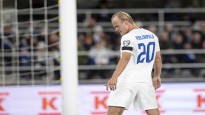The Olympic stadium’s field supervisors have been working in the early winter to make the stadium’s grass grow to playable dimensions.
As Easter approaches, many people grow ryegrass, but the grass at the Helsinki Olympic Stadium has been seriously cared for since the beginning of February.
The Olympiastadion’s field champions have had to sweat around the clock in order to be able to play a possible decisive match for the EC further qualifying place on the field.
The Finnish national team lost the away match to Wales 0–2 in the opening round of the further qualification, so there are no stakes in the match to be played against Estonia at the Olympic Stadium on Tuesday.
The Huuhkajien Kotikenttä still had to be repaired, because according to the European Football Association, Finland can now play national team games in November and March.
A non-stakes national match in the middle of March does not inspire spectators to the stands like a summer match or a decisive struggle for a place in the European Championship. Also, heating the field and growing the grass with the help of heat lamps consumes money and electricity, which causes expenses for the Football Association.
By Wednesday morning of last week, 500 megawatt hours of district heating and 190 megawatt hours of electricity had been consumed. The figures roughly correspond to the annual consumption of a 70-apartment apartment building.
Half a million expenses
General Secretary of the Football Association Marco Casagrande estimates to via e-mail that the ticket revenue will probably cover the stadium rent, snow removal and other direct event costs, such as security personnel and construction.
After the Wales defeat, ticket sales have been sluggish. About 15,000 people are expected at the stadium.
– After the teams’ expenses, we are definitely in the red. However, it must be noted that the match is part of a centralized media rights agreement, so the calculated result will rise again to the plus side if the media rights income is allocated to the match, says Casagrande.
According to Casagrande, the total expenses for the match for Pallloliito are in the order of half a million. Variable costs are lower when the number of viewers is modest.
Casagrande has not received the latest information on how much of the expenses have gone to maintaining the turf, but estimates the amount to be around 100,000 euros.
The grass is in playing condition
Winter conditions have made it difficult to grow grass. We didn’t have time to put the field on the winter tracks in November, when the weather got colder. Snow removal and field heating started already at the beginning of February.
The lamps that care for the lawn were lit at the beginning of the month and were moved every few hours. Most of the lamps were removed on Saturday to get out of the way of the LED advertisements going around the field.
– This is quite a challenging job. For the past three weeks, we have been working around the clock every day, said the stadium’s real estate and security manager Ilkka Rautakivi last week.
– As expected, the frosts have caused challenges for growing grass, a milder March was certainly on the order. The field will be restored to playing condition, but it will definitely be in a worse condition than last summer and autumn, says Casagrande.
The topper of the whiners Arttu Hoskonen commented on Monday that he was doubtful about the condition of the grass in March.
– Let’s see, I don’t know what to expect. I hope it is in good condition so that it would be nice to play.
The consumption level can be adjusted
Casagrande says that the overall finances of the Finnish Football Federation are on a solid footing, even though they missed out on a place in the European Championships.
– For the next strategy period 2025–2028, the spending level as a whole needs to be slightly adjusted. This reflection has already started and decisions will be made in the board and in the club parliament during the fall, while implementing the new four-year strategy to be approved in a month’s time.
Huhkaji’s success is the entry to the previous European Championships and the head coach Markku Kanervan led by “Riveluutio” created the real Huuhkajat boom a few years ago.
Casagrande believes that interest in men’s and women’s national soccer and futsal teams will continue to grow.
– In a couple of weeks, the Helmari have a great match in Italy, the futsal men have the World Cup playoffs in April, and the Huuhkaj already have, among other things, the England match in October.
